Full Title: Navigating Decarbonisation: An approach to evaluate shipping’s risks and opportunities associated with climate change mitigation policy
Author(s): Dr Carlo Raucci, Vishnu Prakash, Isabelle Rojon, Dr Tristan Smith, Dr Nishatabbas Rehmatulla, & James Mitchell
Publisher(s): Rocky Mountain Institute
Publication Date: July 1, 2017
Full Text: Download Resource
Description (excerpt):
In the face of impending climate change mitigation regulations both inside and outside of the shipping industry, there is a need to better understand which assets will remain competitive, which will not, and what this will mean for the owners and financiers of billions worth of assets.
This report outlines a possible approach to evaluating shipping’s risks associated with climate change mitigation policy through an illustrative case study of investments in the newbuild drybulk fleet in the size range 60,000-99,999 dwt.
This approach forecasts the evolution of the global fleet using techno-economic modelling and estimates the ability of an individual vessel to remain competitive in multiple possible futures, which include evolving fleet energy efficiency, regulatory requirements, and macro-economic factors.
Two investment perspectives (short-term and long-term) are taken in a number of scenarios to anticipate how vessels will compete in a range of potential futures. This enables us to incorporate uncertainty into decision-making. Variables defining the scenarios include build year, carbon price, freight rate growth, and market barriers. In the short-term perspective scenario, the shipowner or investor evaluates the investment within a short time horizon. Market barriers to the adoption of energy efficiency technologies in this scenario are high. In the long-term perspective scenario, the shipowner or investor evaluates the investment within a long time horizon and market barriers are low.
